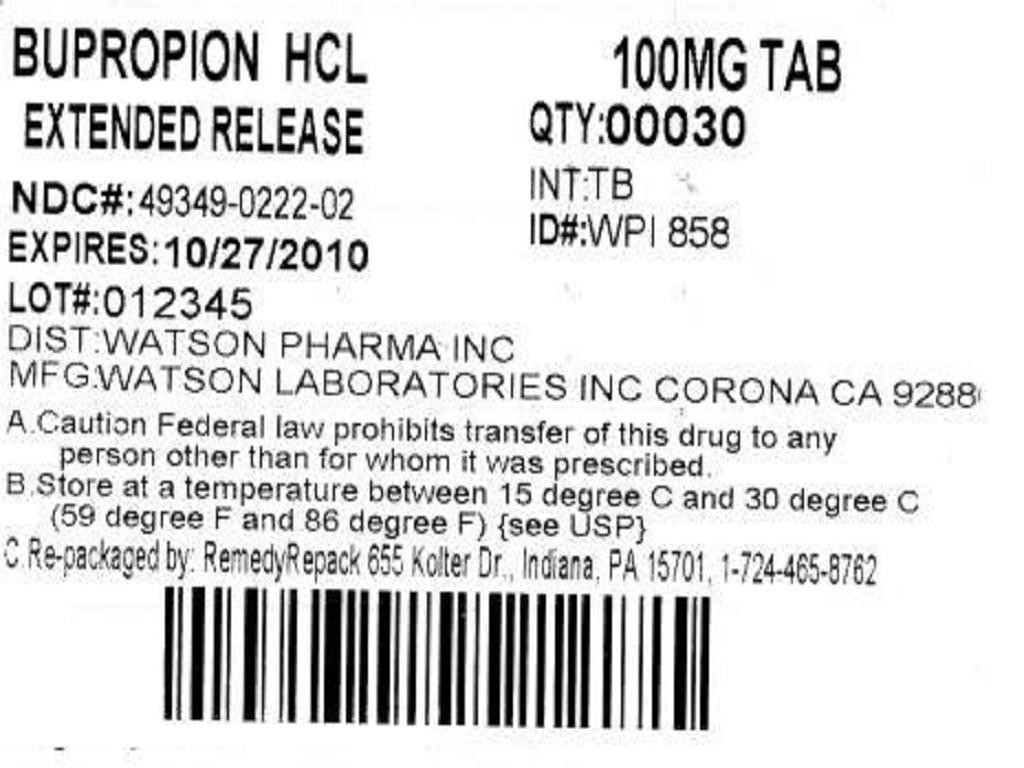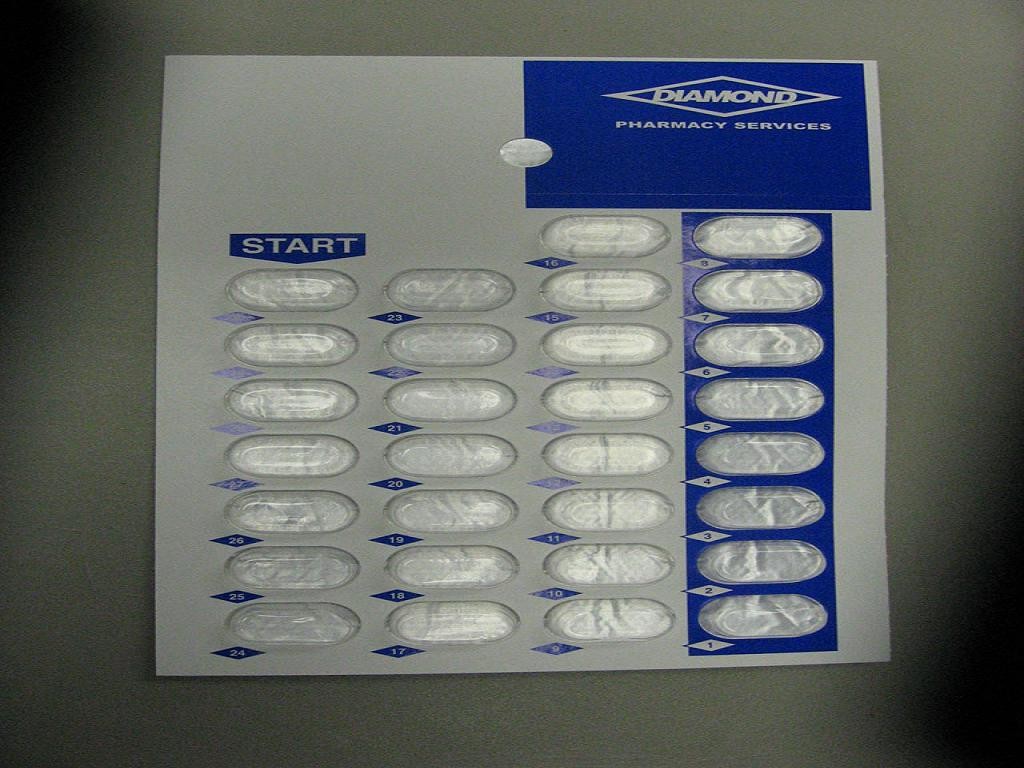Bupropion Hydrochloride
FULL PRESCRIBING INFORMATION: CONTENTS*
- BOXED WARNING
- BUPROPION HYDROCHLORIDE DESCRIPTION
- CLINICAL PHARMACOLOGY
- INDICATIONS & USAGE
- BUPROPION HYDROCHLORIDE CONTRAINDICATIONS
- WARNINGS
- PRECAUTIONS
- INFORMATION FOR PATIENTS
- LABORATORY TESTS
- DRUG INTERACTIONS
- CARCINOGENESIS & MUTAGENESIS & IMPAIRMENT OF FERTILITY
- PREGNANCY
- LABOR & DELIVERY
- NURSING MOTHERS
- PEDIATRIC USE
- GERIATRIC USE
- BUPROPION HYDROCHLORIDE ADVERSE REACTIONS
- DRUG ABUSE AND DEPENDENCE
- OVERDOSAGE
- DOSAGE & ADMINISTRATION
- HOW SUPPLIED
- STORAGE AND HANDLING
- SPL MEDGUIDE
- PACKAGE LABEL.PRINCIPAL DISPLAY PANEL SECTION
FULL PRESCRIBING INFORMATION
BOXED WARNING
WARNINGSuicidality and Antidepressant Drugs
WARNINGS: Clinical Worsening and Suicide Risk in Treating Psychiatric DisordersPRECAUTIONS: Information for PatientsPRECAUTIONS: Pediatric Use
BUPROPION HYDROCHLORIDE DESCRIPTION

CLINICAL PHARMACOLOGY
PRECAUTIONS: Drug Interactions
WARNINGSPRECAUTIONSDOSAGE AND ADMINISTRATION
PRECAUTIONS: Renal Impairment
PRECAUTIONS: Geriatric Use
CLINICAL TRIALS
INDICATIONS & USAGE
CLINICAL PHARMACOLOGY
CLINICAL PHARMACOLOGY
BUPROPION HYDROCHLORIDE CONTRAINDICATIONS
WARNINGS
Clinical Worsening and Suicide Risk in Treating Psychiatric Disorders:-
● Dose: At doses of sustained-release bupropion up to a dose of 300 mg/day, the incidence of seizure is approximately 0.1% (1/1,000) and increases to approximately 0.4% (4/1,000) at the maximum recommended dose of 400 mg/day.
-
● Patient factors: Predisposing factors that may increase the risk of seizure with bupropion use include history of head trauma or prior seizure, central nervous system (CNS) tumor, the presence of severe hepatic cirrhosis, and concomitant medications that lower seizure threshold.
-
● Clinical situations: Circumstances associated with an increased seizure risk include, among others, excessive use of alcohol or sedatives (including benzodiazepines); addiction to opiates, cocaine, or stimulants; use of over-the-counter stimulants and anorectics; and diabetes treated with oral hypoglycemics or insulin.
-
● Concomitant medications: Many medications (e.g., antipsychotics, antidepressants, theophylline, systemic steroids) are known to lower seizure threshold.
-
● the total daily dose of bupropion hydrochloride extended-release tablets (SR) does not exceed 400 mg,
-
● the daily dose is administered twice daily, and
-
● the rate of incrementation of dose is gradual.
-
● No single dose should exceed 200 mg to avoid high peak concentrations of bupropion and/or its metabolites.
CLINICAL PHARMACOLOGYPRECAUTIONSDOSAGE AND ADMINISTRATION
PRECAUTIONS
General:Cardiovascular Effects:
CLINICAL PHARMACOLOGYWARNINGSDOSAGE AND ADMINISTRATION
Renal Impairment:
INFORMATION FOR PATIENTS
LABORATORY TESTS
DRUG INTERACTIONS
CONTRAINDICATIONS
WARNINGS
PRECAUTIONS: Cardiovascular Effects
CONTRAINDICATIONS
CARCINOGENESIS & MUTAGENESIS & IMPAIRMENT OF FERTILITY
PREGNANCY
Teratogenic Effects:LABOR & DELIVERY
NURSING MOTHERS
PEDIATRIC USE
BOX WARNINGWARNINGS: Clinical Worsening and Suicide Risk in Treating Psychiatric DisordersGERIATRIC USE
CLINICAL PHARMACOLOGY
PRECAUTIONS: Renal ImpairmentDOSAGE AND ADMINISTRATION
BUPROPION HYDROCHLORIDE ADVERSE REACTIONS
WARNINGSPRECAUTIONSPRECAUTIONS
PRECAUTIONS
DRUG ABUSE AND DEPENDENCE
OVERDOSAGE
DOSAGE & ADMINISTRATION
WARNINGSCLINICAL TRIALSCLINICAL PHARMACOLOGY
CLINICAL PHARMACOLOGYWARNINGSPRECAUTIONS
CLINICAL PHARMACOLOGYPRECAUTIONS
HOW SUPPLIED
STORAGE AND HANDLING
SPL MEDGUIDE
-
● all risks and benefits of treatment with antidepressant medicines
-
● all treatment choices for depression or other serious mental illness
-
● Pay close attention to any changes, especially sudden changes, in mood, behaviors, thoughts, or feelings. This is very important when an antidepressant medicine is started or when the dose is changed.
-
● Call the healthcare provider right away to report new or sudden changes in mood, behavior, thoughts, or feelings.
-
● Keep all follow-up visits with the healthcare provider as scheduled. Call the healthcare provider between visits as needed, especially if you have concerns about symptoms.
-
● thoughts about suicide or dying
-
● attempts to commit suicide
-
● new or worse depression
-
● new or worse anxiety
-
● feeling very agitated or restless
-
● panic attacks
-
● trouble sleeping (insomnia)
-
● new or worse irritability
-
● acting aggressive, being angry, or violent
-
● acting on dangerous impulses
-
● an extreme increase in activity and talking (mania)
-
● other unusual changes in behavior or mood
-
● Never stop an antidepressant medicine without first talking to a healthcare provider. Stopping an antidepressant medicine suddenly can cause other symptoms.
-
● Antidepressants are medicines used to treat depression and other illnesses. It is important to discuss all the risks of treating depression and also the risks of not treating it. Patients and their families or other caregivers should discuss all treatment choices with the healthcare provider, not just the use of antidepressants.
-
● Antidepressant medicines have other side effects. Talk to the healthcare provider about the side effects of the medicine prescribed for you or your family member.
-
● Antidepressant medicines can interact with other medicines. Know all of the medicines that you or your family member takes. Keep a list of all medicines to show the healthcare provider. Do not start new medicines without first checking with your healthcare provider.
-
● Not all antidepressant medicines prescribed for children are FDA approved for use in children. Talk to your child's healthcare provider for more information.
-
● thoughts about suicide or dying
-
● attempts to commit suicide
-
● new or worse depression
-
● new or worse anxiety
-
● panic attacks
-
● feeling very agitated or restless
-
● acting aggressive, being angry, or violent
-
● acting on dangerous impulses
-
● an extreme increase in activity and talking (mania)
-
● abnormal thoughts or sensations
-
● seeing or hearing things that are not there (hallucinations)
-
● feeling people are against you (paranoia)
-
● feeling confused
-
● other unusual changes in behavior or mood
-
● with certain medical problems.
-
● who take certain medicines.
-
● High blood pressure (hypertension). Some people get high blood pressure, that can be severe, while taking bupropion hydrochloride extended-release tablets (SR). The chance of high blood pressure may be higher if you also use nicotine replacement therapy (such as a nicotine patch) to help you stop smoking.
-
● Severe allergic reactions. Some people have severe allergic reaction to bupropion hydrochloride extended-release tablets (SR). Stop taking bupropion hydrochloride extended-release tablets (SR) and call your doctor right away if you get a rash, itching, hives, fever, swollen lymph glands, painful sores in the mouth or around the eyes, swelling of the lips or tongue, chest pain, or have trouble breathing. These could be signs of a serious allergic reaction.
-
● Unusual thoughts or behaviors. Some patients have unusual thoughts or behaviors while taking bupropion hydrochloride extended-release tablets (SR), including delusions (believe you are someone else), hallucinations (seeing or hearing things that are not there), paranoia (feeling that people are against you), or feeling confused. If this happens to you, call your doctor.
-
● have or had a seizure disorder or epilepsy.
-
● are taking Zyban(used to help people stop smoking) or any other medicines that contain bupropion hydrochloride, such as WellbutrinTablets or Wellbutrin XLExtended-Release Tablets. Bupropion is the same active ingredient that is in bupropion hydrochloride extended-release tablets (SR).
-
● drink a lot of alcohol and abruptly stop drinking, or use medicines called sedatives (these make you sleepy) or benzodiazepines and you stop using them all of a sudden.
-
● have taken within the last 14 days medicine for depression called a monoamine oxidase inhibitor (MAOI), such as Nardil(phenelzine sulfate), Parnate(tranylcypromine sulfate), or Marplan(isocarboxazid).
-
● have or had an eating disorder such as anorexia nervosa or bulimia.
-
● are allergic to the active ingredient in bupropion hydrochloride extended-release tablets (SR), bupropion, or to any of the inactive ingredients. See the end of this leaflet for a complete list of ingredients in bupropion hydrochloride extended-release tablets (SR).
-
● Tell your doctor about your other medical conditions including if you:
-
● are pregnant or plan to become pregnant. It is not known if bupropion hydrochloride extended-release tablets (SR) can harm your unborn baby.
-
● are breastfeeding. Bupropion passes through your milk. It is not known if bupropion can harm your baby.
-
● have liver problems, especially cirrhosis of the liver.
-
● have kidney problems.
-
● have an eating disorder such as anorexia nervosa or bulimia.
-
● have had a head injury.
-
● have had a seizure (convulsion, fit).
-
● have a tumor in your nervous system (brain or spine).
-
● have had a heart attack, heart problems, or high blood pressure.
-
● are a diabetic taking insulin or other medicines to control your blood sugar.
-
● drink a lot of alcohol.
-
● abuse prescription medicines or street drugs.
-
● Tell your doctor about all the medicines you take, including prescription and non- prescription medicines, vitamins, and herbal supplements. Many medicines increase your chances of having seizures or other serious side effects if you take them while you are using bupropion hydrochloride extended-release tablets (SR).
-
● Take bupropion hydrochloride extended-release tablets (SR) exactly as prescribed by your doctor.
-
● Do not chew, cut, or crush bupropion hydrochloride extended-release tablets (SR). If you do, the medicine will be released into your body too quickly. If this happens you may be more likely to get side effects including seizures. You must swallow the tablets whole. Tell your doctor if you cannot swallow medicine tablets.
-
● Take bupropion hydrochloride extended-release tablets (SR) at the same time each day.
-
● Take your doses of bupropion hydrochloride extended-release tablets (SR) at least 8 hours apart.
-
● You may take bupropion hydrochloride extended-release tablets (SR) with or without food.
-
● If you miss a dose, do not take an extra tablet to make up for the dose you forgot. Wait and take your next tablet at the regular time. This is very important. Too many bupropion hydrochloride extended-release tablets (SR) can increase your chance of having a seizure.
-
● If you take too many bupropion hydrochloride extended-release tablets (SR), or overdose, call your local emergency room or poison control center right away.
-
● Do not take any other medicines while using bupropion hydrochloride extended-release tablets (SR) unless your doctor has told you it is okay.
-
● It may take several weeks for you to feel that bupropion hydrochloride extended-release tablets (SR) are working. Once you feel better, it is important to keep taking bupropion hydrochloride extended-release tablets (SR) exactly as directed by your doctor. Call your doctor if you do not feel bupropion hydrochloride extended-release tablets (SR) are working for you.
-
● Do not change your dose or stop taking bupropion hydrochloride extended-release tablets (SR) without talking with your doctor first.
-
● Do not drink a lot of alcohol while taking bupropion hydrochloride extended-release tablets (SR). If you usually drink a lot of alcohol, talk with your doctor before suddenly stopping. If you suddenly stop drinking alcohol, you may increase your chance of having seizures.
-
● Do not drive a car or use heavy machinery until you know how bupropion hydrochloride extended-release tablets (SR) affect you. Bupropion hydrochloride extended-release tablets (SR) can impair your ability to perform these tasks.
-
● Store bupropion hydrochloride extended-release tablets (SR) at room temperature. Store out of direct sunlight. Keep bupropion hydrochloride extended-release tablets (SR) in their tightly closed bottle.
-
● Bupropion hydrochloride extended-release tablets (SR) may have an odor.
-
● Medicines are sometimes prescribed for purposes other than those listed in a Medication Guide. Do not use bupropion hydrochloride extended-release tablets (SR) for a condition for which it was not prescribed. Do not give bupropion hydrochloride extended-release tablets (SR) to other people, even if they have the same symptoms you have. It may harm them. Keep bupropion hydrochloride extended-release tablets (SR) out of the reach of children.
PACKAGE LABEL.PRINCIPAL DISPLAY PANEL SECTION


Bupropion HydrochlorideBupropion Hydrochloride TABLET, FILM COATED, EXTENDED RELEASE
| ||||||||||||||||||||||||||||||||||||||||||||||||||||||||||||||||||||||||||||||||||||
PLEASE, BE CAREFUL!
Be sure to consult your doctor before taking any medication!